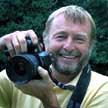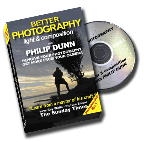
Is there some secret to photographing a wonderful cascade of sparks as an engineer grinds away metal with a disk cutter? Well maybe – but it’s a very simple one. It’s all about light – or more precisely the lack of it - that makes the difference between a picture capturing bright golden spark tracks, and a lack-lustre photograph with washed-out specks where the sparks should be.
Take a look at the main picture of the man producing the great shower of sparks that pour onto the workshop floor and spread out in all directions. You will notice that the background is almost completely dark. His face is lit by the glow of the sparks from below but there is some light on the top of his head. That’s because his workshop was not totally blacked out and has a glimmer of daylight coming down from a sky light above him. Had that light been brighter, it would have put more ambient light onto the background as well, and made the sparks less distinct and bright. As it is, that ambient light is just bright enough to pick out the top of his head while not spoiling the rest of the picture.
However, had there been even less ambient light, I would have been able to use an even longer shutter speed and gather more spark trails – but you must be careful not to ‘over-cook’ it with over-long exposures. In other words, if you leave the shutter open too long you will gather too many sparks and they you will lose the rich orange colours; the sparks will be washed-out. You will also lose the individual lines and patterns of each individual spark and they will become one big white mass.
Take a look at the main picture of the man producing the great shower of sparks that pour onto the workshop floor and spread out in all directions. You will notice that the background is almost completely dark. His face is lit by the glow of the sparks from below but there is some light on the top of his head. That’s because his workshop was not totally blacked out and has a glimmer of daylight coming down from a sky light above him. Had that light been brighter, it would have put more ambient light onto the background as well, and made the sparks less distinct and bright. As it is, that ambient light is just bright enough to pick out the top of his head while not spoiling the rest of the picture.
However, had there been even less ambient light, I would have been able to use an even longer shutter speed and gather more spark trails – but you must be careful not to ‘over-cook’ it with over-long exposures. In other words, if you leave the shutter open too long you will gather too many sparks and they you will lose the rich orange colours; the sparks will be washed-out. You will also lose the individual lines and patterns of each individual spark and they will become one big white mass.

Of course, with slow shutter speeds, it is essential to have your camera on a good, solid tripod.
Yes, the secret, if there is one, is to work, whenever possible, in almost total darkness.
TIP… Always have a small torch with you when working in very dark situations. It helps when changing your camera settings and when moving around a dark workshop.
Next, in Part 2… what shutter speed should you use for best results?
Yes, the secret, if there is one, is to work, whenever possible, in almost total darkness.
TIP… Always have a small torch with you when working in very dark situations. It helps when changing your camera settings and when moving around a dark workshop.
Next, in Part 2… what shutter speed should you use for best results?


No comments:
Post a Comment